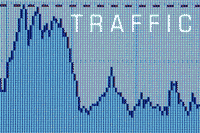Understanding Traffic

| A major point of confusion for some novice website owners is understanding how much traffic their website actually receives. Now while the definition of "traffic" is rudimentary to most, the following scenario conveys the general confusion surrounding the topic for one website owner and the negative impact misquoting this traffic had on his business. |
|
Bob creates a beautifal, image laden website and is ecstatic after his first month online. "I had ten thousand hits this month. Can you believe ten thousand people came to my site already? I just sold advertising space for next month because the media buyer was so impressed - he already sent me a check!"
A careful review of Bob's website logs revealed that he in fact did not generate ten thousand unique visitors, but instead generated twenty-five unique visits. Bob's Internet heart shattered across his keyboard as the news was broken to him. How could he have made this mistake? Bob confused hits for unique visits.
There is enough information in website server logs to keep any professional Internet analyst busy for quite a while. The trick is in comprehending the data that actually reflects not only how many people came to your site, but how many pages they visited and how often they returned. Regardless of the type of statistics package in use (they generally always provides the same basic information) novices and experts alike should be familiar with the components of traffic metrics because, like Bob, they may at some point want to sell advertising on their site and honestly representing traffic metrics is key if the intent is on having advertisers keep paying for that valuable website space.
How much traffic does your website receive?
If you ever intend to know with certainty how many people visited your site and how many pages they visited, understanding "traffic" is a must. This broad term actually consists of a broad group of independent website metrics, namely unique visitors, site visits, hits and page views. The following defines these components so readers can understand their "traffic."
A visit is one trip to a website by an individual (a unique visitor). If a visitor comes to your site (one unique visit) and views various pages, one visit is generated. If that same visitor returns several hours later another visit is generated. So if you have two unique visitors that visit your site today and one of those visitors comes back every day until the end of the month (in a thirty day month) you will end up with two unique visitors and thirty-one visits to your website.
The term 'hits' is one of the single most misunderstood words in the language of the Web - Bob found out the hard way. A hit is essentially what happens when a file is loaded through a user's browser. This means that every time your HTML page appears for a surfer - that is one hit. Now since most HTML pages have components such as images (which are files), each time a logo can be seen by a user can also be counted as one 'hit'. So if you have an HTML page that displays only a logo and a surfer navigates to your domain you have successfully generated one unique visitor and two hits.
Page views are a little less confusing. Page views indicate how many pages were 'viewed' or served to the unique visitors that have visited. One visitor may generate ten page views and another may generate five page views - in which case your two unique visitors generated a total of fifteen page views.
Understanding the components of "traffic" is essential to your online success. Bob found out the hard way that misrepresenting his traffic (albeit unknowingly) to an advertiser is just bad business. Bob returned the advertising revenue he thought he had earned but the advertiser expressed no interest in future advertising opportunities. Bob now accurately quotes the number of unique visitors and page impressions for his site to potential advertisers.
The next issue of Website Services Magazine's "Website Statistics Column" will focus on referrer data and the role that data plays in creating search marketing and pay per click advertising campaigns.
| Instant Survey: Learning Statistics |

Subscribe to Our Newsletter!
Latest in Marketing









